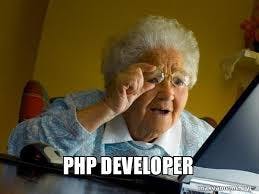It is no doubt that PHP is the most dominant programming language for building websites. In fact over a decade now PHP is powering over 60% of the entire web. PHP is a big name. Facebook, Yahoo, Wikipedia and several top websites are mostly written in PHP.
However, in this article, I will explain three major issues I have with PHP. And why critics who are saying PHP is dead may be right. These reasons have nothing to do with performance, learning curve, or security.
I like to mention that I have spent 6 years writing PHP; it was my first programming language. PHP was easy to learn and I built a WordPress clone within two weeks of reading a book. I love PHP, even now. But, the coding in 2022 is vastly different from 2012. It is hard for me to see PHP in the future or as a language that I will advise anybody to learn today.
Let's get to it.
1. Legacy Codes
From 2008 - 2012, it was easy to find developers building the next WordPress, Facebook, or eBay using PHP. But not in 2022; as you won't find anyone building the next WordPress in PHP.
The next WordPress won't be written in PHP.
So what technology are people building with? Mostly Jamstack/Web3 technologies.
Much of PHP control is on legacy platforms like WordPress, and Drupal; also Laravel, many devs today are using PHP today because of Laravel. But, the problem with PHP power depending on these legacy platforms is that these technologies can decide to transition into another language.
Hard, but gradually possible as we are already seeing with WordPress.
If you are very active in the WordPress Development space, it should have occurred to you (without watching this video) that WordPress may be transitioning into a Javascript platform.
Larevel seems to be the only hope for PHP to maintain relevance, but that is only if it creates more use cases for PHP; because the future of the web is Jamstack/Web3 and PHP is weak here.
2. Limited Use Case
PHP is limited to the web. You can't use it for any other thing than building server-side apps. And the majority of these apps have CRUD functionality, nothing new or interesting.
We are seeing new tech spaces like web3, machine learning, NLP, IoT and spaces where other languages are quickly adapting, but PHP is yet to have any serious development in these spaces.
Remember, web 2.0 was a new development and there was a strong need to create dynamic sites and PHP was improved for this. The languages that didn't improve for web 2.0 lost relevance.
If developments for new tech spaces don't happen in PHP, then the number of PHP developers will keep declining as it has been since 2016.
3. Decline of New Talents
If you learned web development in 2012 (online or offline) chances are your curriculum is HTML/CSS/PHP/MYSQL.

I recall when I decided to learn to code, nearly every coding school is teaching PHP in their main curriculum. However, according to Codecademy 2022, PHP is the 10th most popular programming language among people who are learning to code. If you are learning to code today, chances are you're learning Javascript or Python.
Go to FreeCodeCamp, Codecademy, and Treehouse, and see the courses they are promoting; they are mostly none PHP courses. The numbers speak for themselves, there is a Python video on FreeCodeCamp Youtube with over 35 million views. Jeez, is Python an entertainment? well even paid JS/Python courses on Udemy record more students than PHP courses.
Most new talents are not learning PHP today.
You don't have to look far to confirm this, just browse through Hashnode and dev.to, and you will find more content on Javascript and Python. Not because there are more JS/Python developers, but because that's what new developers are reading.
A shortage of new talents is a bad thing for the future of any language.
If much of PHP boasting continues to rely on the legacy platforms and not on wider use cases outside the web server (FTP), plus fewer and fewer talents learning PHP; then PHP can be said to be default-dead as the future may not be bright for the Elephant in the room.

